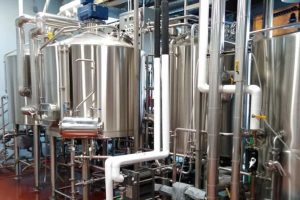
Mar 05, 2021 Brew Up Tax Savings with the R&D Tax Credit
While the trendy term “Microbrewery” mi·cro·brew·er·y /ˌmīkrəˈbro͞oərē / may have been the proper terminology for new craft beer breweries and startups, they no longer remain “micro” in numbers and revenue. Growth in the craft beer industry in the U.S. has steadily grown to almost $30 billion.
While brewing up signature styles of beer is key to their creators’ minds, the Research & Development (R&D) Tax Credit can save the craft brewing industry significant tax dollars and make brewers say, “Hop Hop Hooray”.
The R&D Tax Credit has been an underutilized dollar-for-dollar cash savings in the brewery and beverage industry altogether. With the R&D tax credit being made permanent and the qualifications of R&D more expansive, the credit has become more valuable and lucrative for a small brewery or startup. A misnomer is that a company must be successful or is developing something new for the “world,” whereas the activity only needs to be new or improved to the brewery itself. The R&D Tax Credit can turn skunky brews into sweet aromatic tax savings.
Ask yourself, while you may be known for your signature pale ale, have you been working on brewing up the latest lager to captivate the increasing market? Have you adapted your formulas for changing connoisseurs? It is uncommon that your brewery has not made any improvements to the product, technology or internal processes to grow and maintain success. Internal process improvements are often overlooked and provide valuable savings to the industry.
The benefits that the R&D Tax Credit can provide the brewing industry will not leave you with a hangover, but hopped up for exciting permanent tax savings.
A few examples of activities that would qualify for the R&D Tax Credit are:
• Developing new bottle conditioning
• Generating new or improved manufacturing processes to improve manufacturing flexibility and agility
• Establishing new or improved hopping techniques and styles
• Creating or improving filtration methodologies or waste watermethods
• Developing new or improved product formulations or recipes (e.g. dry hopping)
• Conducting tests of product ingredient mixtures for desired flavor or aroma profiles
• Developing new or improved quality assurance testing processes
• Producing prototype product samples for testing and validation of new recipe formulations
• Testing prototype samples for analytical and microbiological qualities
 While all the above sounds too good to be true, many breweries may be thinking, how does this help us when due to the pandemic, we do not have a profit? The R&D credit was enhanced for small business startups in 2016 and can be applied against your quarterly federal payroll tax instead of your income tax.
While all the above sounds too good to be true, many breweries may be thinking, how does this help us when due to the pandemic, we do not have a profit? The R&D credit was enhanced for small business startups in 2016 and can be applied against your quarterly federal payroll tax instead of your income tax.
Do not let this opportunity go stale. Now may be the time more than ever to explore this power tax savings.
# # #
ICS Tax, LLC (ICS) is a consulting firm providing innovative tax planning strategies. ICS collaborates with taxpayers and their tax professionals to identify credits and incentives that reduce tax liabilities and increase profitability. ICS provides nationwide service through its offices located throughout the country.


